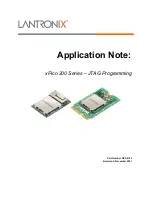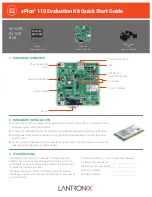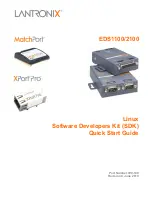
AP08056
Power Saving Features
Operating on a Lower Frequency Clock Mode
Application Note
19
V1.0, 2006-12
6.1
Device Clock in PLL Base Mode
In the PLL base mode, the oscillator is disconnected from the PLL and the system
frequency is derived from the VCO base (free running) frequency clock divided by the K
factor:
The ranges of the VCO base frequency is shown in
The VCO base frequency of different devices will range between 10 MHz to 80 MHz
depending on the VCOSEL setting. Users will need to manually check the system
frequency of each device by outputting the device’s system clock at the CLKOUT pin.
The code example to output the system clock is as follows:
SCU_PAGE = 0x01;
//open SCU page 1 to access COCON
COCON = 0x37;
//select clock output frequency/10
PORT_PAGE = 0x02;
//open port page 2 to access Px_ALTSELx
P0_ALTSEL0 = 0x01;
//select clock out function for P0.0
P0_ALTSEL1 = 0x00;
PORT_PAGE = 0x00;
//open port page 0 to access Px_DIR
P0_DIR = 0x01;
//set P0.0 as output port
At the output of P0.0, the clock output frequency is half of the frequency that is chosen
by the bitfield COCON.COREL. In the above example, the system clock output at P0.0
has been divided by a factor of 10 based on the setting of the bitfield COCON.COREL.
The system frequency can hence be obtained by multiplying the measured frequency by
a factor of 20.
Users must take note that the VCO base frequency that was determined could vary
approximately up to +/- 10% depending on the stability of the power supply to the PLL
(i.e. power supply from EVR) and the temperature.
Table 11
VCO base (f
VCObase)
and system frequency (f
SYS
) ranges
Device
VCOSEL f
VCObase
Range (MHz)
f
SYS
Range
when K = 1
(MHz)
f
SYS
Range
when K = 2
(MHz)
XC866
0
10 - 80
-
5 - 40
1
20 - 80
-
10 - 40
XC886/888
0
20 - 80
20 - 80
10 - 40
1
10 - 80
10 - 80
5 - 40
f
SYS
1
K
---- f
VCObase
⋅
=










































